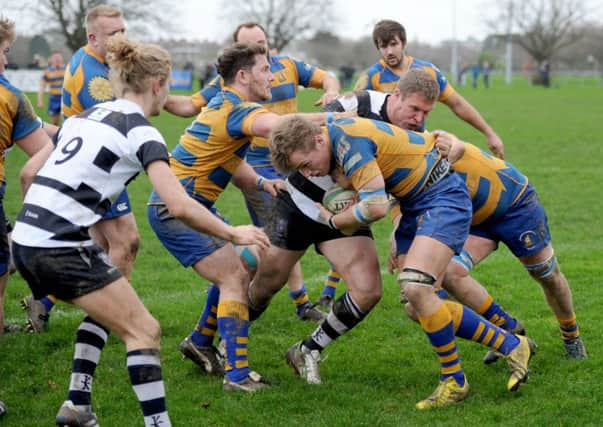Should schools ban rugby tackling?


Officials at Havant Rugby Club have been responding to a letter from more than 70 doctors and health experts which calls on the government to ban tackling in school rugby games.
They warn of a high risk of serious injury among under-18s and said schools should move to touch rugby and non-contact rugby.
Advertisement
Hide AdAdvertisement
Hide AdNigel Phillips, rugby development manager at Havant, said: ‘It’s going to have a huge impact.
‘If you talk to any of the guys and girls we coach, they want to get contact and get involved.
‘The two are never going to marry up if they bring this on.
‘The reason behind it is probably longevity and preventing serious injuries.
‘That’s got to be down to the coaching element.’
He said the current system introduces tackling very slowly to young players.
Advertisement
Hide AdAdvertisement
Hide Ad‘It’s very controlled and systematic with tackling where you start at ground level and work your way up,’ added Mr Phillips.
The signatories – who include sport scholars, academics, doctors, and public health professionals – said studies show the risks of injuries to under 18s ‘are high and injuries are often serious’.
It said many UK secondary schools deliver contact rugby as a compulsory part of the physical education curriculum from age 11.
The letter said: ‘The majority of all injuries occur during contact or collision, such as the tackle and the scrum.
Advertisement
Hide AdAdvertisement
Hide Ad‘These injuries which include fractures, ligamentous tears, dislocated shoulders, spinal injuries and head injuries can have short-term, life-long, and life-ending consequences for children.’
The letter said concussion is a common injury and repeat concussion is most likely among players who have suffered it previously plus there is an association with depression, memory loss and diminished verbal abilities. It also noted that children take longer to recover than adults.
They criticised the government’s drive to boost participation in rugby in English schools by linking schools with rugby clubs.
Signatory Professor Allyson Pollock, from Queen Mary University of London, said: ‘Parents expect the state to look after their children when they are at school.
Advertisement
Hide AdAdvertisement
Hide Ad‘Rugby is a high-impact collision sport and given that children are more susceptible to injuries such as concussion, the absence of injury surveillance systems and primary prevention strategies is worrying.
‘Children are being left exposed to serious and catastrophic risk of injury.’
The Rugby Football Union said ‘high quality coaching, officiating, medical support and appropriate player behaviour’ would help to reduce the risk of injury.
It said it has provided building blocks to the 15-a-side game, so young players have time to get to grips with the basics before contact is gradually introduced in both schools and clubs from September.
Advertisement
Hide AdAdvertisement
Hide AdA spokesman said: ‘This means that full 15-a-side rugby will begin a year later at under 14 and provide a gradual and more managed introduction of the contact game around the tackle will take place from under nine to under 12 instead of over just two years at under nine and under 10 as previously. This will give players, teachers and coaches more time to master the techniques in a safer and more supportive environment.’
The RFU has carried out a three-year injury prevention and surveillance study on schoolboy injuries and created a RugbySafe guidance programme to grassroots organisations and players of all levels, the spokesman said.
The Department for Education said it expects schools to ‘be aware of the risks associated with sporting activities and to provide a safe environment for pupils.’